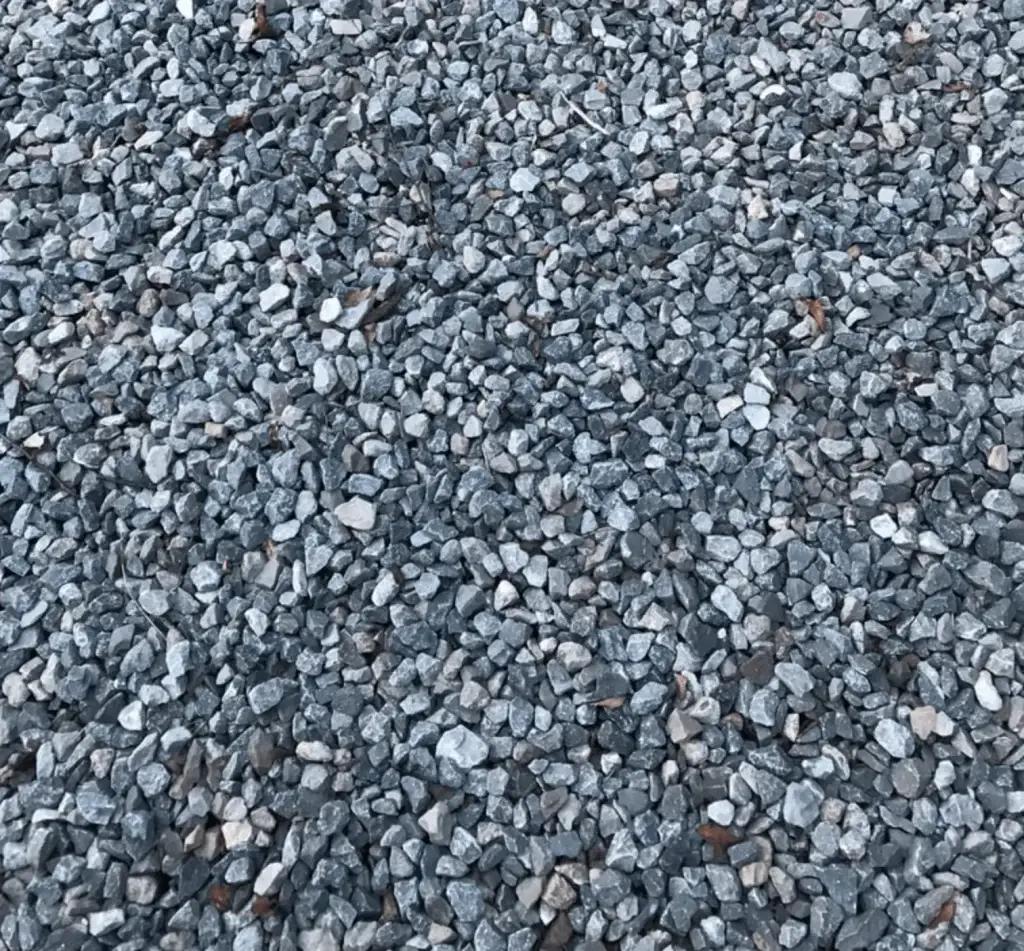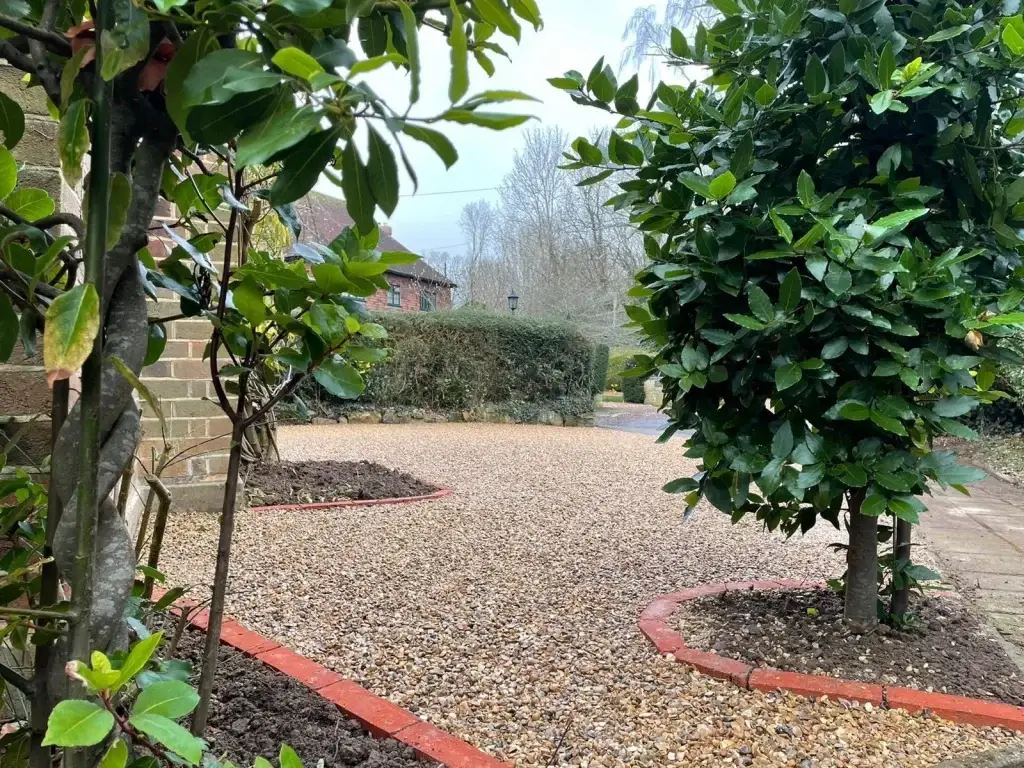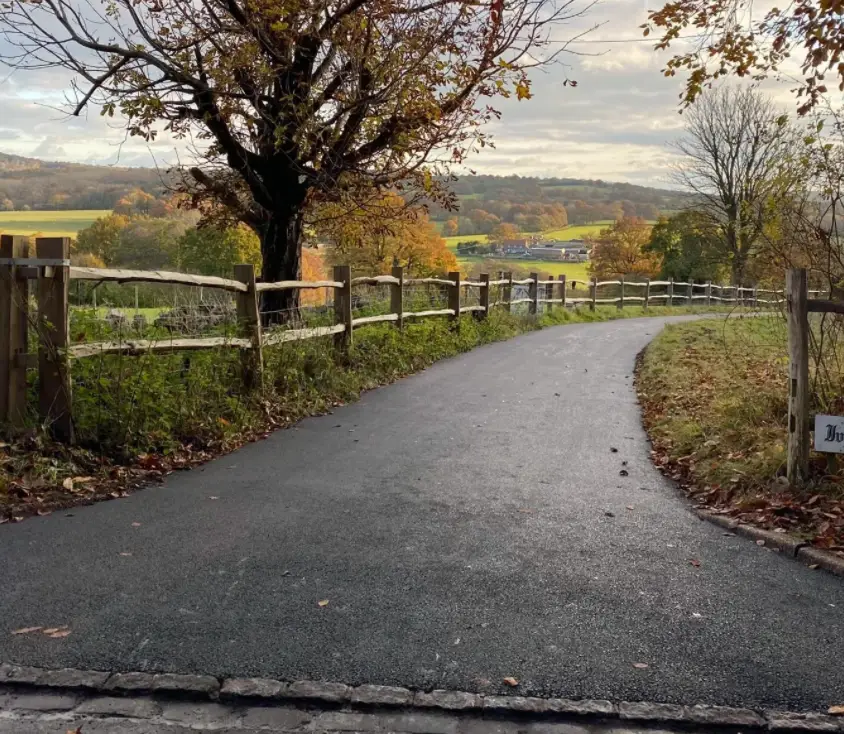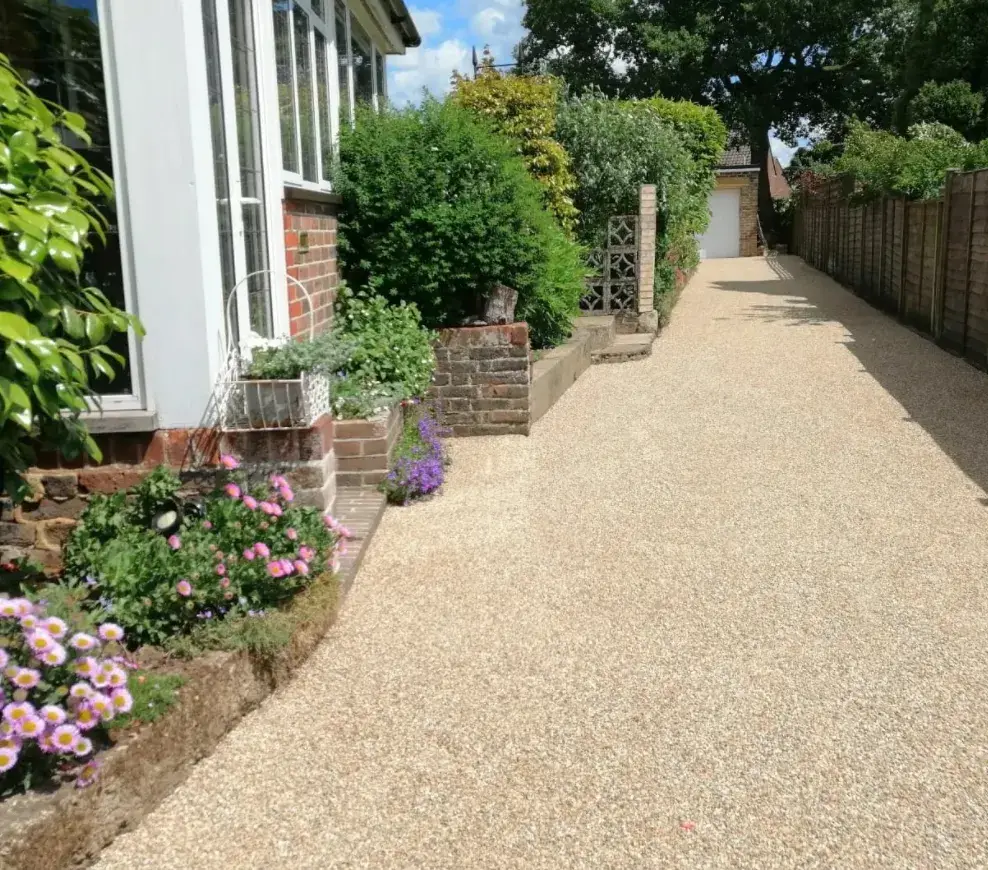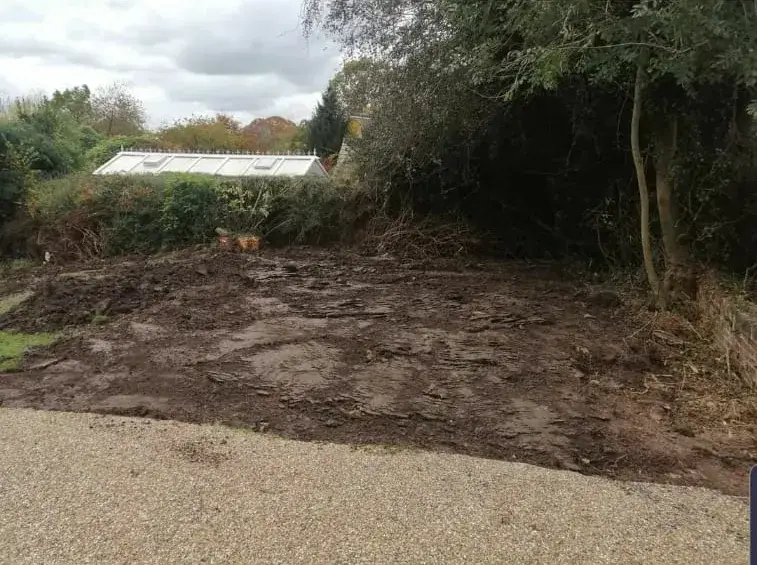There’s no single solution to decide the best way to make your new driveway comply with front garden legislation – it depends on a number of factors including the size of the plot, the aesthetic you’re looking for and what you plan to park on your drive. Permeable paving is specially designed to allow water to soak through the surface, and into the ground below – therefore preventing rainwater from entering sewers without the need for any soft landscaping, drainage channels or soakaways. If you’re interested in installing permeable paving for your driveway, keep reading to see what is permeable paving for driveways, the benefits porous material have, and a few options to choose from.
What Is a Permeable Surface?
You can define permeable as a material or membrane that allows liquids to pass through it.
Permeable pavement can be made up of a series of plastic grids that are filled with materials such a limestone, gravel and sod to make a sturdy surface that allows moisture to soak into the ground naturally. There are benefits of a permeable driveway that should motivate you to settle on the best driveway for your home. They include; Easy Installation Permeable pavers don’t require a lot of expertise to install. When installing this driveway design, you don’t need expensive equipment like when installing concrete or asphalt driveways. Benefits of a Permeable Driveway Generally speaking, the benefits of installing a permeable driveway far outweigh any negatives. The natural drainage prevents puddles and stagnant water and allows rainwater to filter into the ground to remove pollutants and impurities. In areas that see excessive rainfall, permeable driveways can reduce the risk of flooding and protect your neighbourhood! A porous outdoor structure prevents the heat island effect of artificially warming the environment and, for the same reason, is one of the most environmentally friendly ways to finish an outdoor space.
Permeable block paving looks like any other block-paved surface; it adds real class and kerb appeal to the front of your house. In addition, it’s hard wearing and able to withstand the heaviest loads on the road. Permeable paving is specially designed to allow water to soak through the surface, and into the ground below Permeable block paving looks like any other block-paved surface; it adds real class and kerb appeal to the front of your house. In addition, it’s hard wearing and able to withstand the heaviest loads on the road. Permeable paving is specially designed to allow water to soak through the surface, and into the ground below.
Permeable paving is an excellent addition to a rain garden or other lawn area, designed to be eco-conscious and suited to rainwater harvesting. The Problems with Impermeable Driveway Options Impermeable surfaces, built from non-porous driveway material, can cause several problems and often require more maintenance than permeable surfaces. Non-permeable surfaces will hold water and rain until warmer temperatures allow for evaporation. The major advantage here, other than the obvious environmental benefits, is the fact that rain water is FREE and can save you huge amounts on mains water, particularly if you are on a metered supply. The reason for building a permeable driveway, rather than a traditional impermeable one, is to reduce the amount of excess water runoff that can overwhelming drainage systems. This is encouraged by the planning regulations. Hopefully you will see that there are good reasons for going down this route and now understand all the options for the different types of permeable driveways and porous hard surfaces.
Driveways Installing a loose aggregate gravel driveway is one of the cheapest and easiest ways to ensure that your driveway surface is permeable. A gravel driveway complies with modern, sustainable urban drainage systems and produces a natural, porous surface that requires little maintenance or cleaning. The large gaps present between each individual piece of gravel create a natural drainage system that allows rainwater to safely make its way into the soil and ground beneath your driveway surface.
Resin bound driveways are permeable and a great design that allows water to drain through it naturally. Interestingly, it is easy to install resin bound pavers, and you don’t need planning permission. All you need is to site survey the area you want to install your driveway and make sure it is suitable for use. Resin driveway is one of the popular driveway types among many homeowners. Resin pavers help create stylish and beautiful driveways and stand out above other types of driveways. Resin bound driveways are permeable and a great design that allows water to drain through it naturally.
Resin-bound surfacing is made from a blend of loose aggregate in which every piece has been coated with a clear polyurethane resin. In contrast, resin bonded surfacing is made by sprinkling loose aggregate onto a coat of resin. It is not permeable, must be laid on a non-porous asphalt or concrete base and will require the installation of an open soakaway (a large hole designed to soak up excess water) to adequately remove any rainwater from the driveway. A resin-bound surface has many benefits, including a smooth finish and no loose gravel, resulting in redistribution.
Are driveway permeable pavers expensive to install? There’s often a list of pros and cons that come with these answers, or at least a little explaining to do, but we’ve amassed a fair amount of knowledge during our time. From front gardens to flag paving, opting for a permeable sub-base and surface material provides many benefits for the homeowner and the environment in general.
You will not need planning permission if a new or replacement driveway of any size uses permeable (or porous) surfacing which allows water to drain through, such as gravel, permeable concrete block paving or porous asphalt, or if the rainwater is directed to a lawn or border to drain naturally. If the surface to be covered is more than five square metres planning permission will be needed for laying traditional, impermeable driveways that do not provide for the water to run to a permeable area.
The 3 common types of permeable pavement include: Traditional Concrete/Asphalt: The standard mix minus the fine particles which are left out to make it more porous. Plastic Pavers: The plastic grids have a honeycomb shape that allows vegetation, such as grass, to grow through the holes. he 3 common types of permeable pavement include: Traditional Concrete/Asphalt: The standard mix minus the fine particles which are left out to make it more porous. Plastic Pavers: The plastic grids have a honeycomb shape that allows vegetation, such as grass, to grow through the holes.
Resin Bound Permeable Driveways – Benefits of Permeable Driveways
Permeable Driveways in Resin — Benefits of Permissible Driveways. 51% 2 votes. When transforming a house it is important not to ignore the driveway and the permeable driveway. Many people spend many thousands renovating their houses but don’t spend much on their driveways. Driveways are viewed most often by visitors to your home. Therefore, you need to spend as much money as necessary in your garage. If you plan on building a driveway in a house, you will have several different ideas.
Is Permeable Paving for Driveways the Best? [Pros & Cons]
People constantly look for new solutions that will increase sustainability. It can be done easily using permeably sealed driveway surfaces. Those types of pavement permit water to drain through them, preventing sludge from escaping through streets. It also supports groundwater resupply which is very good environmentally and economically. Plus, it is not necessary to have a permit from the city to install the driveways. Throughout our 15+ year experience in landscaping, our company often receives inquiries from people regarding permeable surfaces on roads. Are blocks of pavement impermeable? Do permeability driveways cost more?
Are Resin Driveways Permeable? Resin-bound driveways are permeable, but a resin bonded surface is not. Resin-bound surfacing is made from a blend of loose aggregate in which every piece has been coated with a clear polyurethane resin. The contractors that you opt to work with should also have a clear understanding of the material that works best with resin driveways. Final Thoughts If you are looking forward to reviving your driveway, the permeable resin is the best option to go for. Resin driveways are a true environment solution and will last for many years if properly installed. They are also easy to install and come with the anti-slip technology and are completely safe to walk on. If you are looking for paving guidance and assistance there is no need to fret.
Make sure the contractors that you choose are licensed and trained enough. The contractors that you opt to work with should also have a clear understanding of the material that works best with resin driveways. Final Thoughts If you are looking forward to reviving your driveway, the permeable resin is the best option to go for. Resin driveways are a true environment solution and will last for many years if properly installed.
The legislation instead advises people who are changing their driveways to use drainage systems which manage the water on their own land, instead of directing it to shared sewers – effectively, using sustainable drainage systems to create eco-friendly driveways that don’t create a flood hazard. Sustainable drainage systems (Suds) – it’s one alternative to traditional piped systems of water drainage systems.
Unlike a normal paver driveway installation, there is no sand installed on a permeable paver project. Installed using permeable pavers, this driveway installation helped this homeowner curb is issues of pooling water around his stairs and garage doors. he sustainable, environmentally-friendly design of permeable paving means you do not need planning permission for this kind of driveway installation on your front garden. The crushed stone will then be compacted before the permeable pavers are laid. Unlike a normal paver driveway installation, there is no sand installed on a permeable paver project. Installed using permeable pavers, this driveway installation helped this homeowner curb is issues of pooling water around his stairs and garage doors. Installed with small-rock like crush, water flows seamless through the joints back into the ground – allowing this client to have a water free driveway!
This can result in permanent puddles, dangerous ice and stagnant water, all of which can damage your driveway or paved area and pose a risk of injury. Installing a non-permeable driveway will require planning permission from the council, which can often be a long and tedious process. Opting for a permeable pavement or driveway surface with an adequate drainage system completely removes this necessity. The choice of materials, styles and finishes for such hard standing surfaces is huge, with a finish sure to suit any tastes.
Driveways and block paving installations made from permeable materials allow for rainwater harvesting and sustainable urban drainage systems, as well as preventing runoff water from pooling and causing damage to your driveway surface. A permeable surface is essential for a flat driveway. It can even allow homeowners to freely remove and re-install their driveway or block paving without applying for planning permission. All the runoff water should be channeled to them to be absorbed or removed, meaning that it does not end up in the drainage system.
There’s no single solution to decide the best way to make your new driveway comply with front garden legislation – it depends on a number of factors including the size of the plot, the aesthetic you’re looking for and what you plan to park on your drive.
You will not need planning permission if a new or replacement driveway of any size uses permeable (or porous) surfacing which allows water to drain through, such as gravel, permeable concrete block paving or porous asphalt, or if the rainwater is directed to a lawn or border to drain naturally. In contrast, resin bonded surfacing is made by sprinkling loose aggregate onto a coat of resin. It is not permeable, must be laid on a non-porous asphalt or concrete base and will require the installation of an open soakaway (a large hole designed to soak up excess water) to adequately remove any rainwater from the driveway. A resin-bound surface has many benefits, including a smooth finish and no loose gravel, resulting in redistribution. Easy Installation Permeable pavers don’t require a lot of expertise to install. When installing this driveway design, you don’t need expensive equipment like when installing concrete or asphalt driveways. You just need to clear the vegetation and grade the ground. At the base, you can install a layer of rock and then lay the grids making sure that they are properly trimmed.
The good news is you won’t require planning permission, which means you will save money and can get on with the job quickly. We hope this post has helped you decide which materials will work best for porous driveways. Porous Driveways are Built The driveway will need to be dug out and then built back up to the desired surface level. The depth you need to dig out the driveway does depend on the local conditions; if the soil is loose and will not provide a firm base you will need to dig out more to provide a deeper sub-base.
Permeable pavement isn’t ideal for building airport runways and highways. Stormwater Management There is another major benefit of installing permeable pavement — stormwater management . Permeable pavements help in managing stormwater efficiently by re-establishing a natural hydrologic balance and reducing the volume of runoff. It releases the precipitation slowly in the ground rather than letting it flow into storm drains, which is a huge wastage.

